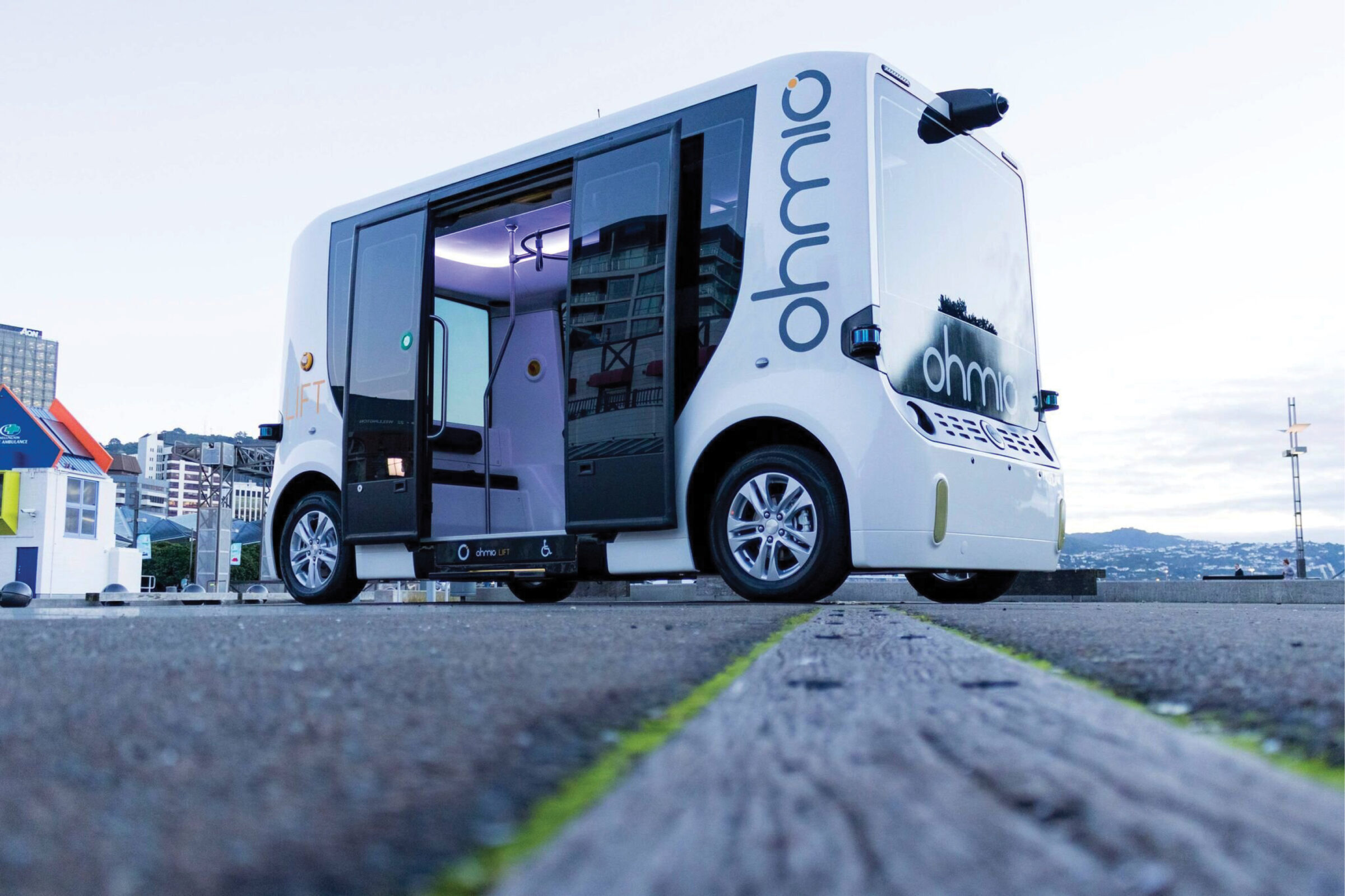As long-distance trips go, this one was a humdinger.
Auckland, New Zealand–based Ohmio, an upstart builder of driverless shuttles, announced on November 30 that it will relocate its headquarters and factory to Riverside, California.
The announcement came two days after the Riverside City Council entered into an agreement to purchase three Ohmio shuttles that will be used in a pilot program in town.
The $2.5 million deal means that Ohmio will soon move its main center of operations from Pakuranga, an eastern suburb of Auckland, to Riverside in the Inland Empire of Southern California — 21 time zones away from New Zealand.
In a public statement, the company said that it chose Riverside in part because the city of 320,764 people in Riverside County is home to the Southern California headquarters of the California Air Resources Board. The firm also said that it plans to collaborate with University of California-Riverside, the school’s Center for Environmental Research and Technology (CE-CERT), California Baptist University, La Sierra University and the Riverside Community College District.
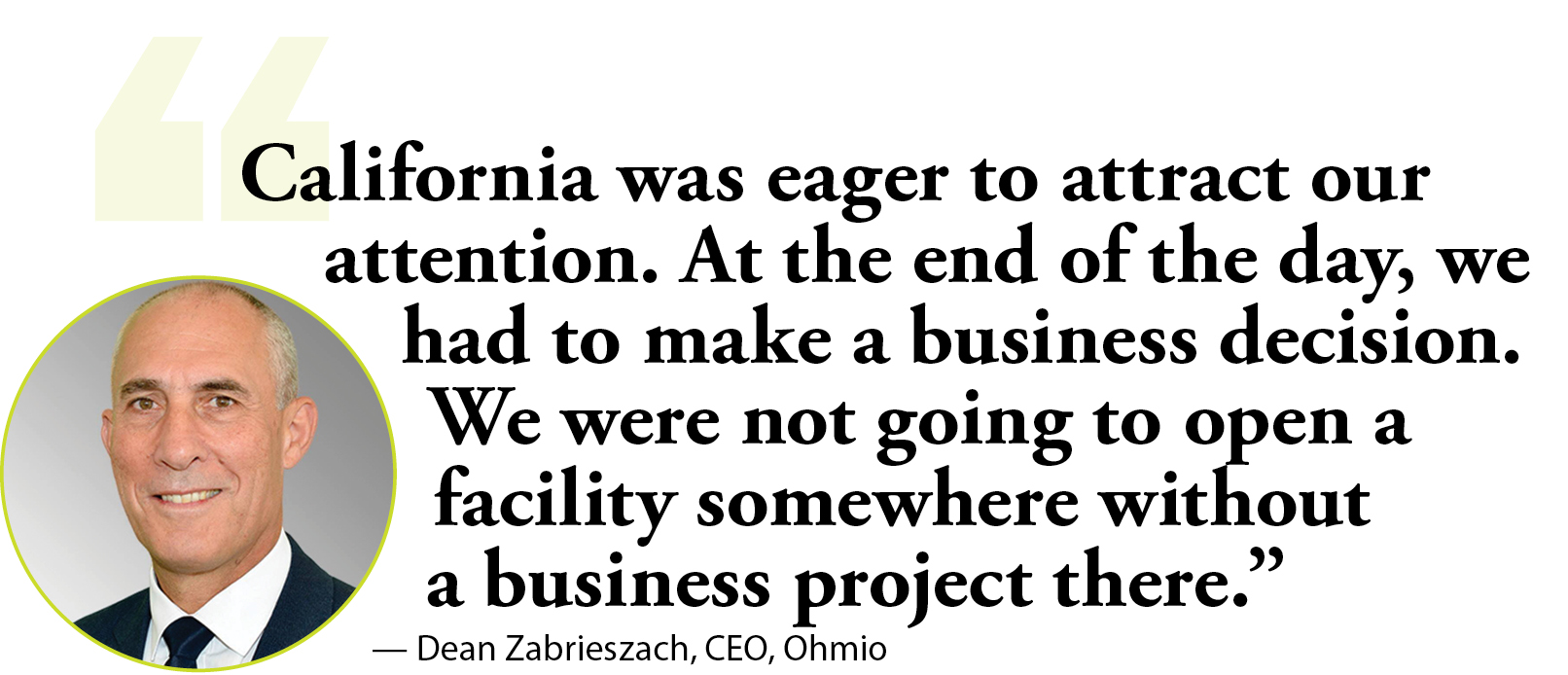
“Riverside is emerging as a global center for clean and green technology, and Ohmio is the next step in that evolution,” Riverside Mayor Patricia Lock Dawson said. “This company provides an important building block for Riverside’s future economy.”
The company claims that its driverless shuttles will be “the first end-to-end, all-electric autonomous shuttles manufactured from the ground up in the United States.” Each shuttle seats eight passengers and has room for an additional six standing riders. The vehicles can travel up to 25 miles per hour and are designed to run on a fixed route. The company expects to sell them for $300,000 to $400,000 apiece.
Ohmio AVs are on the road in New Zealand, Australia, South Korea, Luxembourg and New York. The firm plans to expand operations into the Netherlands, the United Kingdom and Finland. Ohmio says it will hire 25 people over three years to assemble vehicles at the plant in Riverside.
Two USA Marketing Programs Worked
I spoke with Ohmio CEO Dean Zabrieszach, based in Melbourne, Australia, via Zoom on December 18 and asked him how his company came to the decision to relocate to a place that is a 15-hour flight away. Two U.S. initiatives played a key role, he said: Buy America and SelectUSA.
“By 2017, we had developed our own autonomous drive. We just needed a vehicle to install it,” says Zabrieszach. “We converted three small golf carts into autonomous vehicles (AVs). They were red, blue and green. We showcased them in Christchurch, New Zealand. We then produced the Ohmio Lift AV, which we plan to make and sell in the U.S.”
That is where two federal programs came into play.
“Since we intend to market our shuttles to government agencies, we knew that Buy America principles would apply in the long run,” the CEO says. “If we wanted to bid for government funding and have more work that is sustainable, the vehicles would need to be built in the U.S. America is a huge market. We decided that is where we want to be.”
The second influential program was SelectUSA.
“We visited Maryland in May of 2023 for the SelectUSA Investment Summit,” says Zabrieszach. “We spoke to representatives of various states. We had meetings with reps from Florida, Arizona and California.”
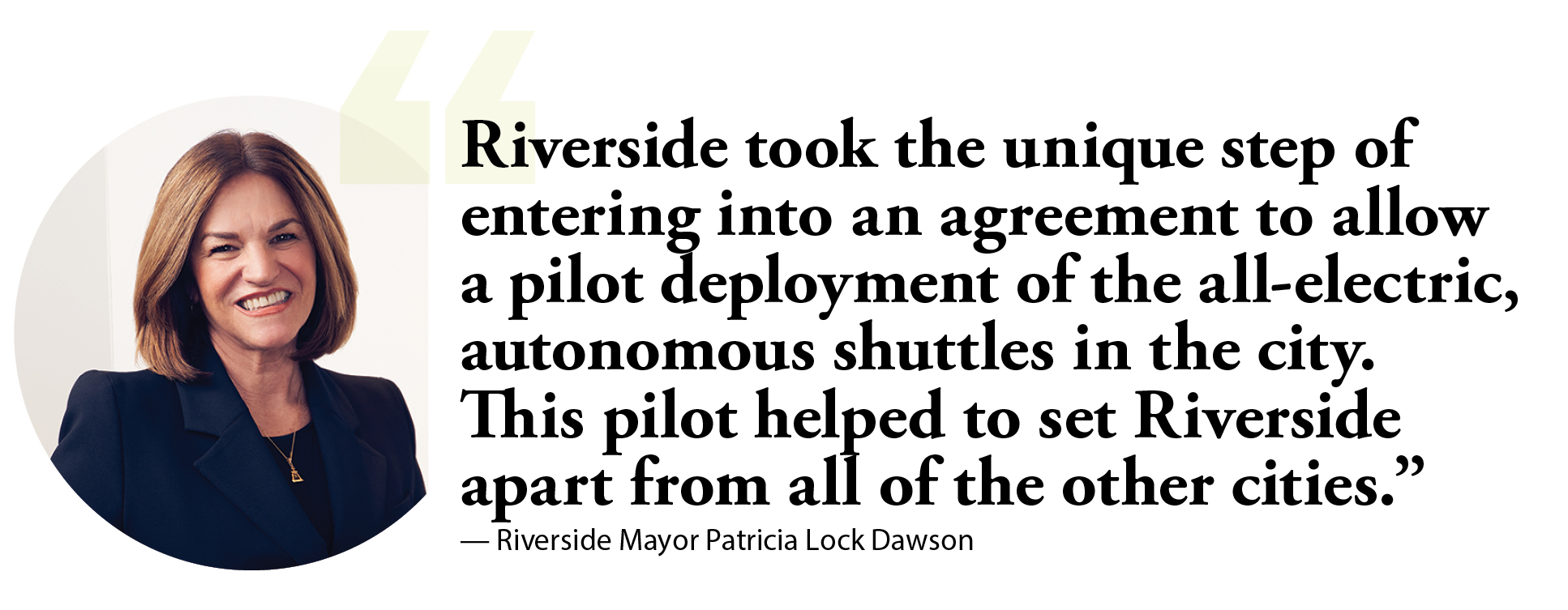
Zabrieszach and his team met with representatives of the City of Riverside. “UC-Riverside was the initial contact we made,” the CEO says. “The city showed a huge welcoming gesture to us. We quickly learned that the cost of doing business in Riverside is better than it is in other parts of California. Plus, the city is keen on working with us. Several academic partners in the area want to work with us too.”
The final agreement to bring Ohmio to Riverside came on November 28 when the City Council voted 6-to-1 to approve the purchase and incentive deal with the company.
“Our goal is to produce the first three vehicles by May of 2024 and have them in use in various parts of Riverside,” says Zabrieszach. “We will sign a lease for space in the next few weeks. We have narrowed it down to two or three sites in the city. That is where we will place our headquarters and our factory.”
One of those sites reportedly is a 40,000-sq.-ft. facility in the Hunter Park industrial area of Riverside. The goal of the pilot program is to augment the existing transit infrastructure in the community, says Zabrieszach.
How California Beat Out Arizona and Florida
Asked why they chose California over Florida and Arizona, the CEO says, “California was eager to attract our attention. At the end of the day, we had to make a business decision. We were not going to open a facility somewhere without a business project there.”
Mayor Lock Dawson says it was not a slam dunk that her city would win the deal.
“The City of Riverside acted quickly upon learning that Ohmio was looking to relocate its international headquarters, advanced manufacturing facility and research and development to the United States,” she wrote in an email to Site Selection. “While California was on their list of states to explore, there were many cities across the U.S. that engaged Ohmio. However, the City of Riverside took the unique step of entering into an agreement to allow a pilot deployment of the all-electric, autonomous shuttles in the city. This pilot helped to set Riverside apart from all of the other cities.”
Riverside has been recognized as a national leader in sustainable practices. For example, the city recently was honored for having the No. 1 Green Fleet in North America by the National Association of Fleet Administrators, the vehicle fleet industry’s largest association representing more than 38,000 fleets across the U.S., Canada and Mexico.
Even though a number of AV companies have been established for some time, Zabrieszach says there is room in the marketplace for an AV shuttle maker like Ohmio. “The AV business is going to be a $70 billion industry in the future,” he says. “There are a handful of very good competitors in Europe, but there is nobody like us. We control what goes into our vehicles from start to finish. We design and manufacture the autonomous drive ourselves; and we are entirely owned by one shareholder.”
That shareholder is Mohammed Hikmet, executive chairman of Ohmio. Hikmet leads HMI Technologies, the parent company of Ohmio. HMI was founded in 1999 and has grown into one of the leading AV and intelligent transport businesses in the Asia-Pacific region.
Rail Transportation Advances On Multiple Fronts
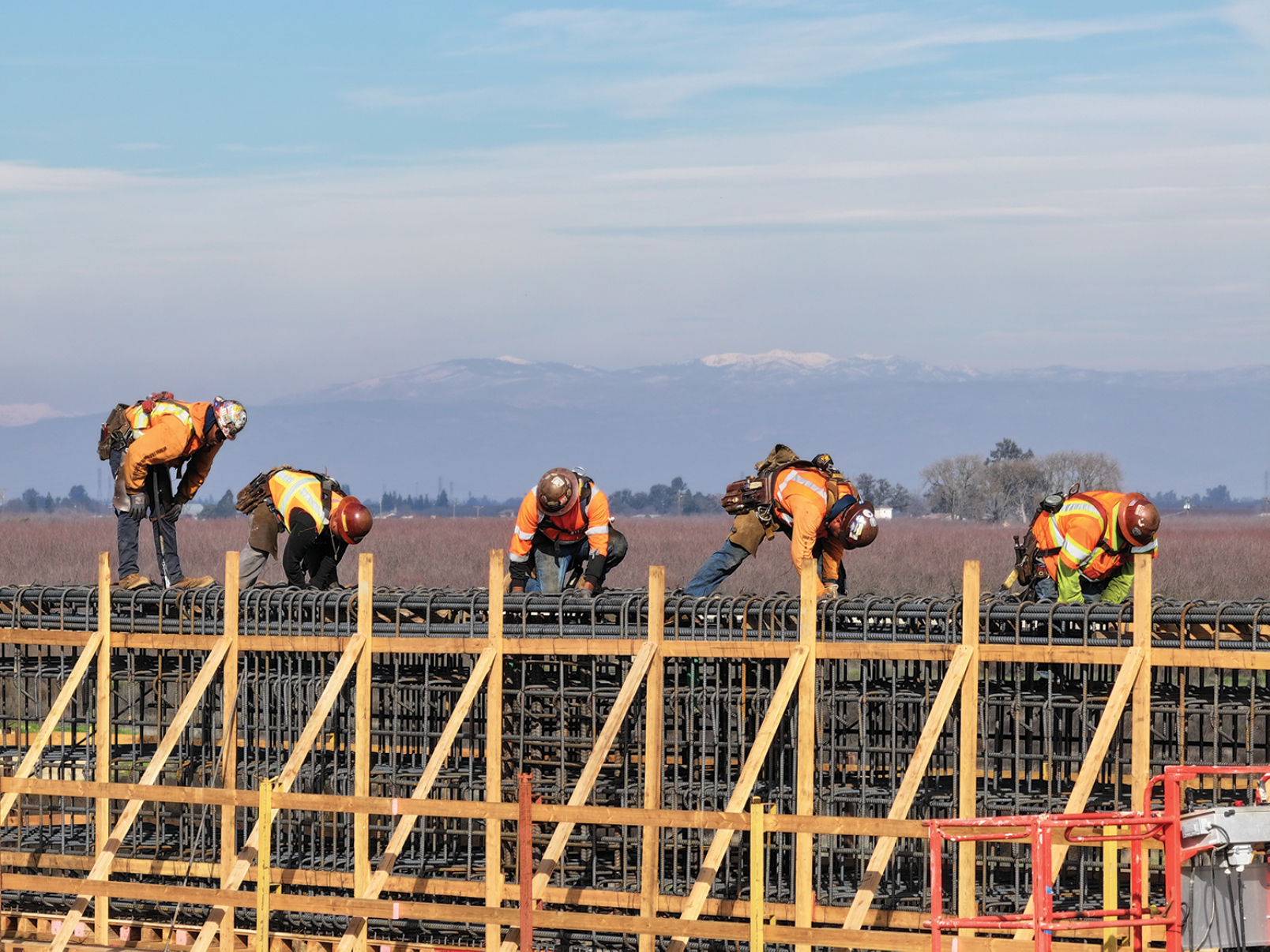
The Mountain View Avenue Grade Separation project is one of more than 25 active high-speed rail construction sites in California’s Central Valley.
Photo by Justin Chechourka courtesy of California High Speed Rail Authority
The awarding of more than $3 billion in federal grant money from the Bipartisan Infrastructure Law to the California High-Speed Rail Authority in December to advance construction in the Central Valley on the planned 220-mph L.A.-to-San Francisco service punctuated a year of concrete progress along the 500-mile route.
“This historic federal investment sends a clear message that America is serious about high-speed rail, starting right here in California,” said California Transportation Secretary Toks Omishakin. “With a federal partnership that’s stronger than ever, we are well on our way to delivering fast, clean and reliable high-speed rail service to connect our state’s population centers.”
The award through the Federal-State Partnership for Intercity Passenger Rail Program came after two grants awarded in 2023 worth $222 million. Last year 10 structures were completed along the southernmost 119 miles, and environmental clearances were achieved for 422 miles of the route.
The overall project has created more than 12,000 jobs. In January the Authority announced that two qualified bidders would be qualified to bid on an upcoming RFP for electrified high-speed trainsets: Siemens Mobility and Alstom Transportation.
The Authority’s annual economic impact analysis report released in January said investment in planning and construction since 2006 has totaled $11.2 billion. The project is estimated to have created a total of 92,000 job-years of employment, spurring $7 billion in total direct labor income earned by workers and $18 billion in total economic activity.
“As of December 2023, more than 810 certified small businesses in California are also helping build high-speed rail; $1.47 billion has been earned by certified Small Businesses, Disadvantaged Business Enterprises and Disabled Veteran Business Enterprises,” the report states. “Estimates show the complete build-out of the 494-mile Phase 1 System between San Francisco to Los Angeles/Anaheim, via the underway Central Valley section, would cumulatively create a total of 945,000 job-years of employment, and total economic activity of $203.6 billion.”
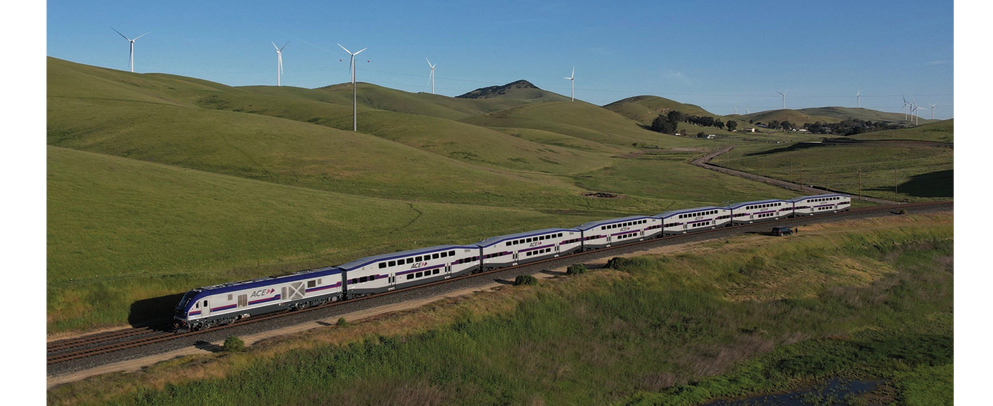
Photo courtesy of ACE
In other passenger rail news, the San Joaquin Regional Rail Commission recently closed escrow on land for a station in Elk Grove that will help bring to the city the Altamont Corridor Express (ACE), whose rail service between the Central Valley and Silicon Valley (pictured) is expanding between Sacramento and San Jose.
“A new train station in Elk Grove is not just a transportation hub, but a gateway for connecting with our untapped potential,” said Elk Grove Mayor Bobbie Singh-Allen. “The station will close the gap between Elk Grove and the Bay Area, remove barriers like a lengthy commute for top talent, and provide further incentive for businesses to start in, or relocate to, Elk Grove.” — Adam Bruns
